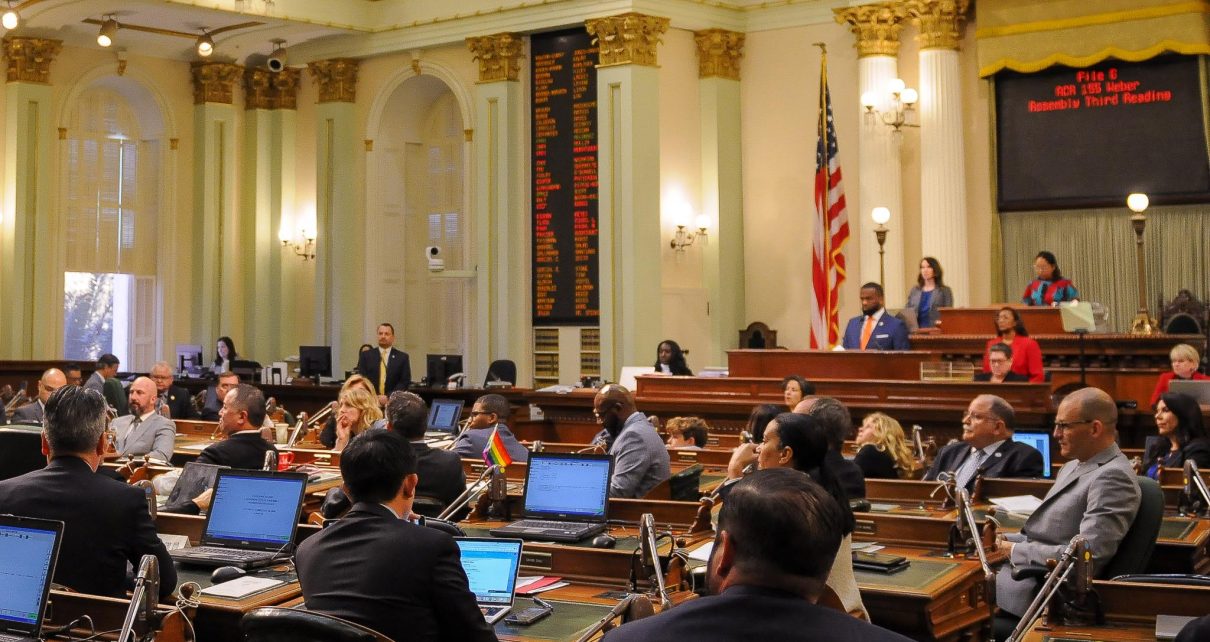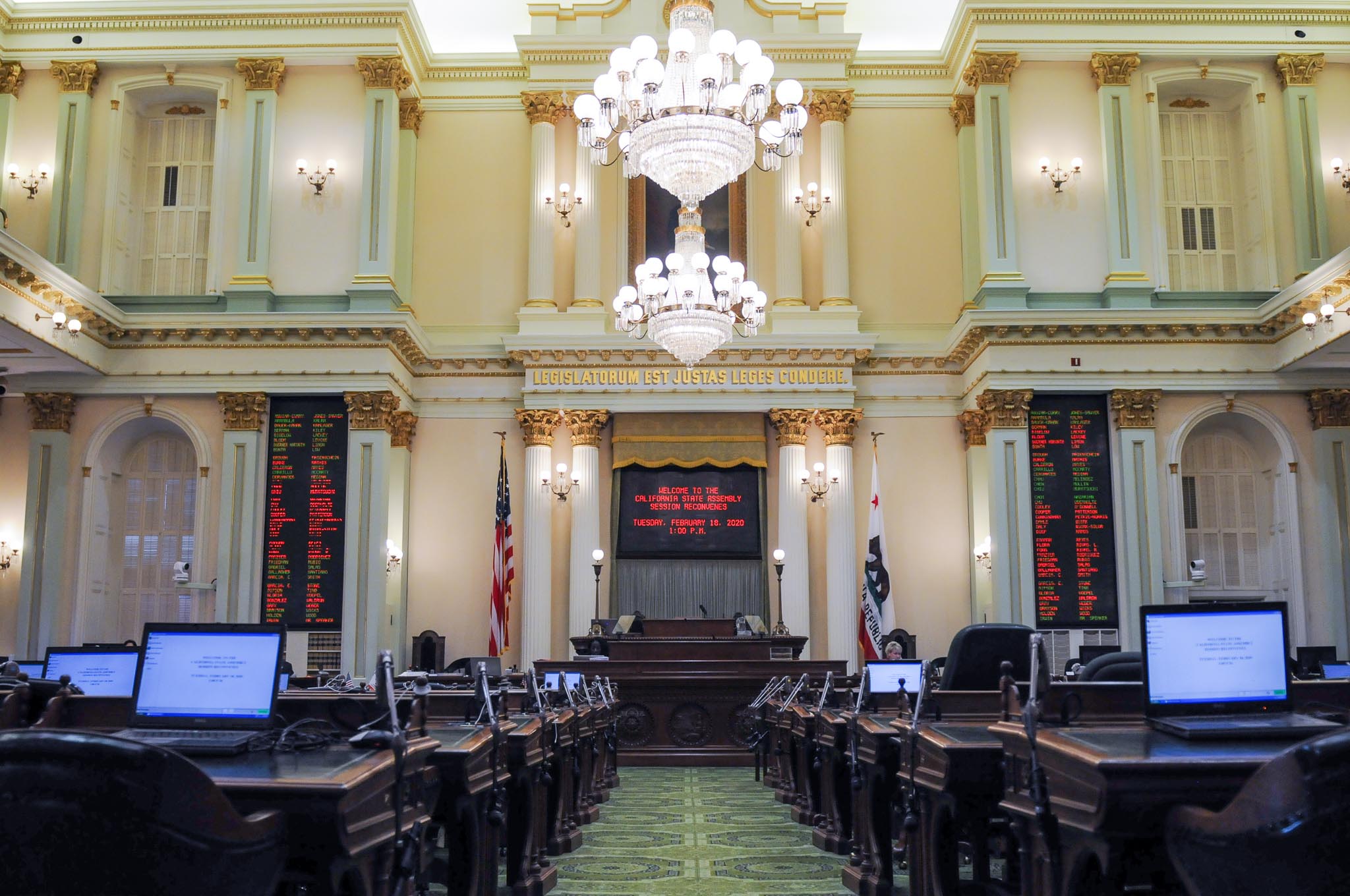
California State Assembly. (Photo: Kevin Sanders for California Globe)
Electing California’s Assembly Speaker
A review of the applicable constitutional, statutory, and house rules
By Chris Micheli, November 10, 2022 3:30 pm
With the convening of a new 2-year California Legislative Session, the Senate and Assembly will organize their respective houses and elect their leaders on December 5 when the 2023-24 Legislative Session officially begins. This article briefly reviews the applicable constitutional, statutory, and house rules, with a focus on the Assembly leadership.
Constitution
California Constitution Article IV, Section 3(a) provides: “The Legislature shall convene in regular session at noon on the first Monday in December of each even-numbered year and each house shall immediately organize.” Thereafter, Section 7(a) provides: “Each house shall choose its officers and adopt rules for its proceedings.”
Pursuant to the state Constitution, the Legislature will convene its new 2-year session on Monday, December 5 at noon and their charge is to “immediately organize.” They do so by choosing their officers and adopting their procedural rules. This occurs in both the Senate and the Assembly.
Government Code
Government Code Section 9023 provides: “At the day and hour appointed for the assembling of any regular session of the Legislature, the Chief Clerk of the Assembly, or in case of his absence or inability, the senior member elect present, shall take the chair, call the members elect to order, and call over the roll of counties in alphabetical order. As the counties are called the members elect shall present their certificates, take the constitutional oath of office, and assume their seats. If there is more than one senior member elect present and the senior members are unable to agree as to who shall call the session to order, the Attorney General or one of his deputies shall call the session to order. If a quorum is present, the Assembly shall then elect its officers, and there shall be no other business, motion or resolution considered before the election of the Speaker, save and except a motion to adjourn or a motion for a call of the house.”
Pursuant to state statute, on December 5, the Assembly Chief Clerk will convene the Assembly Floor Session, call the Assembly Members to order, and call the roll of newly-elected Members. Thereafter, the Members take their oath of office and seats on the Floor. Finally, the Members will elect their officers. Any other action is prohibited until the Speaker is elected.
Government Code Section 9171 provides: “The officers and employees of the Assembly are: (a) A Speaker, a Speaker pro Tempore, a Majority Floor Leader, a Minority Floor Leader, one Chief Clerk, one Sergeant at Arms, one Minute Clerk and one Chaplain. (b) Other officers and employees deemed necessary by the Assembly and provided for by resolution of the Assembly. Officers and employees in subdivision (a) except the Majority and Minority Floor Leaders and Minute Clerk shall be elected by a majority vote of the duly elected and qualified Members of the Assembly. The Minute Clerk shall be appointed by and serve at the pleasure of the Chief Clerk, subject to approval by the Assembly Rules Committee.”
Pursuant to state statute, a majority vote of duly-elected Assembly Members is required to elect the Speaker, a Speaker pro Tempore, one Chief Clerk, one Sergeant at Arms, and one Chaplain.
Government Code Section 9173 provides: “All permanent officers and employees of the Senate or Assembly, except the President of the Senate and the Majority and Minority Floor Leaders and Minute Clerk of the Assembly, shall be elected by the house to which they are attached.”
Pursuant to state statute, the officers of the Assembly and Senate are elected by the Members of their respective houses.
Government Code Section 9173 provides: “Any officer or employee appointed or elected by the Senate or Assembly may at any time be removed in the same manner as is provided for his election or appointment.”
Pursuant to state statute, the officers of the Assembly and Senate can be removed by a majority vote of the Members of their respective houses.
Government Code Section 9910 provides: “The Speaker is responsible for the efficient conduct of the legislative and administrative affairs of the Assembly. The Speaker shall be elected upon organization of the Assembly at the beginning of each regular or special session and shall serve until adjournment sine die of that session, unless removed pursuant to Section 9173 and a successor chosen pursuant to the rules of the Assembly.”
Pursuant to state statute, the Speaker is elected when the Assembly organizes itself at the beginning of each regular session, scheduled for December 5 this year. The Speaker serves until final adjournment nearly two years later, unless removed by the elect of a successor.
Assembly Rules
Assembly Rule 1, Assembly General Officers, provides: “The general officers of the Assembly are the following: (1) Speaker; (2) Speaker pro Tempore; Assistant Speaker pro Tempore; Majority Leader; Republican Leader; and (3) Chief Clerk; Sergeant at Arms; Chaplain. (b) Except for the officers listed in paragraph (2) of subdivision (a), each officer listed in subdivision (a) shall be elected by a majority vote of the duly elected and qualified Members.”
Pursuant to the Assembly Rules, the Speaker, Chief Clerk, Sergeant at Arms, and Chaplain are all elected by a majority vote of the Assembly Members in office.
Assembly Rule 5, Organization of Assembly, provides: “For the purposes of the organization of any regular session of the Assembly pursuant to Section 9023 of the Government Code, the person who was the Speaker when the previous regular session adjourned sine die, if that person is reelected to the Assembly, shall be deemed to be the senior member elect.”
Pursuant to the Assembly Rules, the prior Session’s Speaker (assuming that person was reelected to office) is the “senior member elect” and presides over the Floor Session if the Assembly Chief Clerk is unable to do so.
- Frequently Asked Questions about When Elected Officials Take Office - April 25, 2024
- Frequently Asked Questions About Ethics Training for Local Agencies - April 24, 2024
- Frequently Asked Questions about Privileges of Voters in California - April 23, 2024





Meh, Democrats will elect a new Democrat Assembly Speaker who will be more left than the last and have even worse ethics.